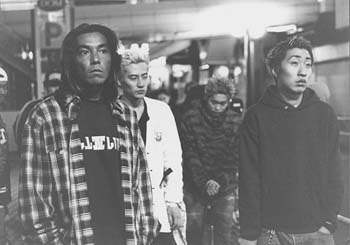Masashi Yamamoto's 'Food' for Thought
The Tokyo underworld shines in fragments in segmented 'Junk Food'
By Michelle Goldberg
THERE'S NO REASON for Junk Food to be as mesmerizing as it is--it's deliberately plotless, gratuitously brutal and coldly distant. Despite these drawbacks, Masashi Yamamoto's new film is surprisingly entrancing. A tour through 24 hours in Tokyo's fractured underworld, Junk Food is a dispassionately observed kaleidoscope of violence and desperation spiced with odd subcultural details like Japanese versions of B-boys and lowriders.
The film unfolds in segments, but the sections' relations to each other are even more tenuous than in Short Cuts or Pulp Fiction--often they are as slight as two characters passing each other on the street. Through it all, DJ Krush's eerie trip-hop soundtrack lends a semblance of moody unity.
The film begins and ends with an elderly blind woman waking up to an alarm clock, saying prayers at her small living-room shrine and then going to the supermarket. She doesn't appear anywhere else in the film. After this sequence, we meet Miyuki, a young, middle-class junkie, as she wakes in a sleeping man's room. She gets high and then climbs on top of the sleeping man, initiating what appears to be a playfully kinky bondage scene that quickly turns harrowing.
After Miyuki leaves, we follow her around the city, first to her boring office job and then on her fiendish search for drugs. These are among the most interesting scenes in the film, as Yamamoto alternates between his own crime-scene objectivism and Miyuki's nauseated, swirling subjectivity.
Tokyo through Miyuki's eyes has the fractured, oversaturated quality of a panic attack, and the viewer can feel her tension and sickness building. Unfortunately, we never get inside her head or make sense of anything she does. She barges into a restaurant where an old lover is having a business lunch and demands 50,000 yen to "wash her underwear." She lets a dealer beat her up and then make gentle love to her. Then she returns home to a sweet-seeming husband who has cooked her dinner. We don't see her again.
Other characters include a Mexican woman wrestler who seems fiercely acrobatic in the ring but vulnerably domestic on the phone to her family at home, a Pakistani murderer, an American-born prostitute, warring gang members and a heavy-metal type who needs to throw a dead friend's ashes in the sea. As could only happen in a film so heavy with neon-lit paranoia, the friend actually died of insomnia.
Junk Food seems like a damning negation of the idea of Tokyo as a haven of futuristically antiseptic safety. So much action takes place in alleys and dark neglected streets that the characters literally seem to be living in the city's cracks. Despite Yamamoto's icy reserve, the sheer repetition of so many lost people wandering the cavernous, imposing metropolis creates a lulling melancholy. His refusal to judge his characters feels both comfortingly forgiving and disturbingly amoral.
[ San Jose | Metroactive Central | Archives ]
![]()

Night People: Tokyo is not for tourists in brutal 'Junk Food.'
Junk Food (R; 84 minutes), directed and written by Masashi Yamamoto, photographed by Hiroshi Ito and starring Miyuki Ijima, Yoshiuki, Mia, Esther Moreno, Ali Ahmed and Onimaru.
From the October 8-14, 1998 issue of Metro.
![[Metroactive Movies]](/movies/gifs/movies468.gif)